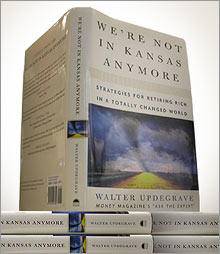|
|

|
|
More information on Updegrave's new book.
|
|
|
|
|
|
|
NEW YORK (CNN/Money) -
My wife and I recently came into an inheritance of approximately $120,000. We are both recently retired and have a decent retirement income. So where would you recommend that we put this money to grow it?
-- Gene, Marietta, Georgia
Ah, if only we all could count on such pleasant surprises to give us a margin of comfort in retirement. But the fact that you say you already had a decent retirement income before you got your windfall suggests that you weren't counting on being bailed out by it.
That's an important lesson to all those people out there who think they might inherit some wealth from their parents or other relatives. Save and invest as if you'd have to retire without any windfall because it may never materialize.
Given ever-increasing life spans and steadily rising health-care costs, parents or other relatives may very well run through their wealth during their lifetimes, leaving very little or even nothing in the way of a bequest. Better to save and invest for retirement as if you'll receive nothing and then be pleasantly surprised if a bonanza comes your way than to be depending on it only to have it fall through.
The specifics
But back to your specific question: what to do with your $120,000 windfall?
The first thing I'd do is set aside a portion of it -- say, $20,000 or so -- in a money-market fund or other very stable investment (a savings account, CD, whatever) as a reserve fund.
This way, you'd have some cash that you could dip into in the event of an emergency -- a big medical bill, a roof that needs replacing, etc. -- without having to disturb your ongoing sources of income. You could also look at this reserve fund as something you could tap for the occasional splurge. After all, you've probably worked hard and planned well to create your retirement income, so why not do something nice for yourself like take an extra trip or buy airline tickets so your grandkids can visit?
Normally, I'd say you could invest the remaining $100,000 pretty aggressively since you say you don't really need the funds. But since you're already retired and you've described your income as "decent" as opposed to, say, "lavish" or even "quite comfortable," I'm going to assume that there's a chance you might want to tap into your stash at some point to supplement your retirement income, even if that's some time down the road.
Diversify
Which leads me to suggest what I might call a "Retiree Conservative Growth" strategy that calls for more stocks than bonds so you'll get good long-term growth. But not so much more that you'll get clobbered by market setbacks.
You can adjust the stock and bond percentages up or down to reflect your own tolerance for risk, but I think that putting about 60 percent of your hundred grand in stocks funds and the remaining 40 percent in bond funds is a pretty decent plan.
I'd keep most of the stock allocation in large-company stock funds and stash perhaps a small portion of it -- say, $5,000 or so -- in small-stock funds that can provide an extra return kick over the long run. In the bond portion of your portfolio, I'd stick mostly to funds with short- to intermediate-term maturities (two to seven years) so that your bond holdings don't get decimated if interest rates head north.
If you want some suggestions for specific funds, you might check out the MONEY 50, our magazine's elite list of recommended funds that appears in every issue. Or you can screen for funds using our Fund Screener.
If you take that approach, I recommend you focus not on funds that have terrific short-term gains, but ones that have shown consistent performance over the years and that keep their costs below the average for their category. That approach won't guarantee superior long-term performance -- nothing can -- but it should tilt the odds in your favor.
Walter Updegrave is a senior editor at MONEY Magazine and is the author of "We're Not in Kansas Anymore: Strategies for Retiring Rich in a Totally Changed World."

|